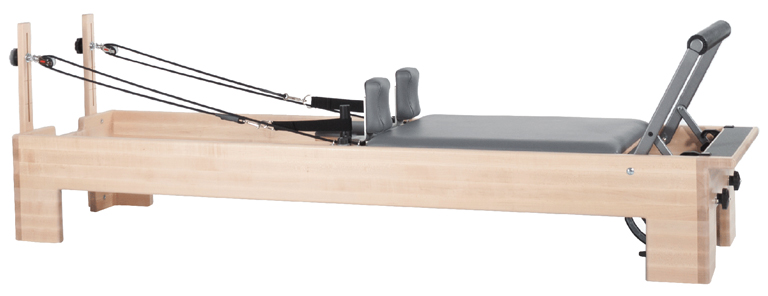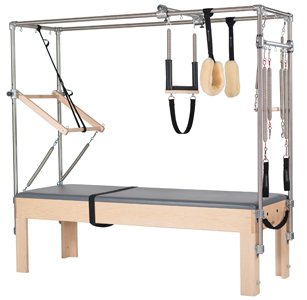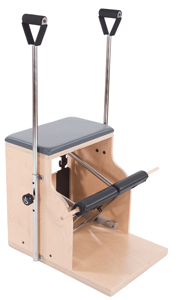La connaissance du corps humain est essentielle pour se préparer à enseigner la méthode Pilates.
- Période de temps : 12 semaines
- Durée de l'enquête : 18 heures
- Prérequis : Aucun
Le programme Pilates Comprehensive Studio Instructor est conçu pour les étudiants passionnés par la promotion de l'équilibre et de la santé. Il allie harmonieusement le travail au sol et l'équipement complet du studio, conformément à l'approche holistique de Joseph Pilates. En combinant ces éléments, le programme vise à favoriser un corps fort, souple, équilibré et sain, inspirant et motivant les étudiants à rejoindre ce voyage transformateur.
La connaissance du corps humain est essentielle pour se préparer à enseigner la méthode Pilates.
Remarque : Les cours obligatoires sont à la charge de l'étudiant en dehors de l'écolage : quatre cours privés ou semi-privés et dix cours d'agrès (l'étudiant reçoit dix cours collectifs de tapis lors de l'écolage).
Remarque : Les cours obligatoires sont à la charge de l'étudiant en dehors de l'écolage : quatre cours privés ou semi-privés et dix cours d'agrès (l'étudiant reçoit dix cours collectifs de tapis lors de l'écolage).
La formation Studio Comprehensive incorpore l'utilisation des quatre appareils clés du studio Pilates : Reformer, Cadillac/Tower, Chairs, Barrels. Les petits appareils et équipements de la méthode Pilates seront également introduits : Ped-a-Pole, Correcteurs de pieds et d'orteils, Disques rotateurs, Sac de sable, Serviette.
Le Reformer a été le premier appareil créé par Joseph Pilates et reste l'appareil principal dans un studio Pilates pour un entraînement complet du corps. L'objectif du Reformer est de fournir une surface instable à laquelle le corps doit s'adapter pour développer des réflexes proprioceptifs et améliorer les schémas de déclenchement neuromusculaire dans le corps. La résistance des ressorts sollicite le corps de manière concentrique et développe la force et la souplesse. Le Reformer convient aux personnes de tous âges et de tous niveaux.

Le premier Cadillac a été créé par Joseph Pilates sur le modèle d'un lit d'hôpital dont les ressorts étaient fixés au mur. Le Cadillac offre une surface stable, une résistance aux ressorts et permet une amplitude de mouvement multidirectionnelle. Il est excellent pour travailler les petits groupes musculaires et pour des exercices de rééducation spécifiques. Dans un studio de Pilates, elle est utilisée dans le cadre d'une séance d'entraînement pour répondre aux besoins spécifiques d'un individu. La plupart des exercices de Cadillac peuvent être effectués sur une tour (à l'exception des exercices de suspension).

Conçue à l'origine par Joseph Pilates pour être utilisée dans les petits appartements de New York, la chaise est l'appareil de Pilates le plus pratique. Elle se prête à une utilisation à domicile ou dans de petits studios et peut être utilisée pour effectuer un large éventail d'exercices, de la rééducation à l'acrobatie. La nature pratique de cet appareil a donné naissance à des variantes de la "chaise Wunda" d'origine ; il existe maintenant la "chaise basse", la "chaise haute" et la "chaise à accoudoirs". Traditionnellement, la chaise était utilisée pour répondre aux besoins individuels, mais elle peut être utilisée pour ajouter de la variété et du défi à un cours collectif. Les exercices peuvent être effectués debout ou assis, ce qui la rend efficace pour les personnes qui ne peuvent pas s'allonger, accessible aux femmes enceintes et excellente pour la rééducation.

Les tonneaux ont été créés par Joseph Pilates pour placer la colonne vertébrale dans une position "idéale" afin d'ouvrir et de décompresser l'avant du corps tout en développant la force et la souplesse. Il existe de nombreux types de tonneaux et de petits appareils apparentés : tonneaux à échelle, correcteurs de colonne vertébrale, arcs de bébé et versions contemporaines.
Le petit matériel de Pilates permet de se concentrer davantage sur les besoins très spécifiques d'un individu. Le petit matériel comprend : le Ped-a-Pole, pour améliorer l'alignement postural et la force ; le Foot corrector, le Toe corrector et la Towel - pour renforcer et aligner les orteils, les pieds et les chevilles ; le Sand Bag, pour renforcer les mains et les poignets. Il y a aussi le Reformer Jump Board, pour ajouter un élément cardio à une séance d'entraînement, pour renforcer les jambes et corriger la frappe des pieds.
Tous les certificats de fin d'études et les diplômes sont valable 2 ans.
Ensuite, vous pouvez suivre des cours de formation continue avec Corpus Studios™ pour mettre à jour votre diplôme.
Vous devez obtenir 10 heures de Crédits de formation continue (CEC) tous les deux ans afin de conserver votre diplôme, du mois de janvier suivant votre dernier examen à Corpus Studios au mois de janvier deux ans plus tard. Si vous êtes un étudiant continu et que vous avez moins de deux ans d'écart entre les cours, le cours le plus récent compte comme CEC.
Les offres à venir sont répertoriées à l'adresse suivante www.corpusstudios.com
Remarque : Environ deux semaines avant le début du cours, vous recevrez un courriel contenant des informations pratiques.
Le montant total du cours (moins la caution) est payable au studio le premier jour du cours.
Tous les étudiants sont tenus de s'inscrire aux cours et aux examens au moins deux semaines à l'avance, sur notre système de réservation en ligne, et de remplir les documents figurant dans notre dossier d'inscription. Si vous ne le faites pas, vous risquez de ne pas pouvoir participer aux cours.
Le paiement intégral d'un cours inscrit est dû le premier jour du cours, au studio. Il peut être réglé par carte de crédit, Bancontact ou en espèces. Le paiement intégral inclut la taxe sur la valeur ajoutée 21%.
Si le paiement n'est pas effectué le premier jour du cours, l'entrée au cours peut vous être refusée et votre dépôt peut être retenu. Si cela n'est pas possible, seul votre formateur ou le propriétaire du studio peut approuver les paiements programmés avant l'inscription au cours.
Veuillez contacter info@corpusstudios.com pour obtenir le dossier d'inscription au cours.
Corpus Studios™ reconnaît que les étudiants diffèrent en termes d'intérêts, de temps et de finances disponibles pour suivre une formation à un moment donné.
Tous les cours sont organisés sur la base de la participation et nous devons nous assurer d'un engagement viable. En cas d'annulation d'un cours, vous serez intégralement remboursé.
Si vous avez besoin d'une aide financière, Corpus Studios™ propose un plan de remboursement. Payez l'acompte sur le cours, puis réglez le reste en 3 versements - à des dates convenues.
Le paiement final incluant le coût de l'examen doit être effectué avant l'inscription à l'examen à la fin du cours. Contactez le studio pour un rendez-vous.